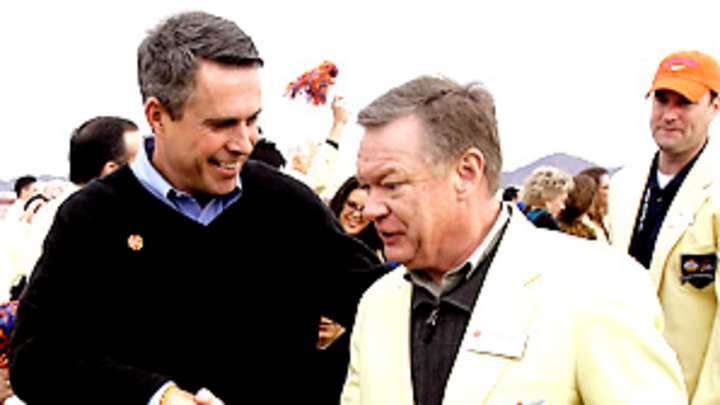Fiesta Bowl probe results in Junker dismissal, casts pall over BCS

That pathetic quote appears on page 240 of the bowl's 276-page, 1,500-footnote "Special Committee Report" -- the result of a recently completed investigation that was launched last fall. That evening of adult entertainment is but one of many instances outlined in the report of brazen, scandalous behavior by Junker and others on the Fiesta Bowl payroll that included, but wasn't limited to: funneling money to politicians through bowl employees; coaching witnesses, and altering documents during the investigation that followed; taking junkets to college football games with politicians and their families -- all on the bowl's dime. On page 210 is a charge that the bowl footed the $33,188 bill for Junker's 50th birthday party, a four-day bacchanal in Pebble Beach that had, according to one attendee, "absolutely no business purpose."
As Duane Woods, the bowl's chairman, told 30 or so demoralized employees on Tuesday afternoon in the wake of Junker's firing, "The cover-up was worse than the crime." (As of late Tuesday, SI.com's calls to 15 current and former employees had gone unreturned.)
The investigation that brought down one of the most powerful figures in college football came on the heels of a previous investigation, which the Fiesta Bowl was forced to conduct in December 2009. That investigation came in response to allegations in The Arizona Republic that Fiesta Bowl employees were regularly reimbursed for making contributions to state and local politicians -- a felony. Employees would write a check, the story alleged, then be reimbursed shortly afterward, usually in the form of a bonus from the Fiesta Bowl. (Junker denied the allegations at the time and has not commented publicly since.)
The Fiesta Bowl hired Grant Woods (no relation to Duane), a former Arizona attorney general, to look into the matter. As the 276-page Special Committee Report makes clear, Woods' initial investigation was hasty, superficial and deeply flawed by the participation of Gary Husk, a longtime lobbyist for the Fiesta Bowl who is alleged to have been one of the people who solicited those illegal contributions in the first place. Husk is also alleged to have "pre-screened" and "prepped" six potential witnesses before they were to speak with Woods.
After declining to speak with SI.com on Tuesday, Husk released a statement saying, "I have provided evidence that the accusations that have been made against me are not credible."
Woods was paid $55,000 for his investigation -- $20,000 of which he remitted to Husk -- on which he spent nine days. He spoke to seven current employees and two former employees, and announced to the board on Dec. 22 that he'd found "no credible evidence" that the allegations in TheRepublic were true -- this despite being told by former Fiesta Bowl employee Doug Blouin that he himself had made contributions, and that the practice was widespread. Blouin's claims were dismissed as those of a "disgruntled" ex-employee. Woods, meanwhile, later told The Republic, in explaining his findings, that "key people may have lied to me."
The truth only emerged after Junker's executive assistant, Kelly Keogh, paid a visit to Duane Woods in his office. Suffering from a crisis of conscience, she informed the Chairman that, regardless of what Grant Woods' investigation had concluded, employees had been reimbursed, that the practice had been widespread and that she herself had participated in it. She told Woods that he "was being used."
Woods took it from there, calling an emergency meeting of the Board's Executive Committee, which (as committees will do) spawned still another committee. This "Special Committee" was charged with conducting a second, more comprehensive investigation: the four-month probe that brought Junker down.
Some of its other findings:
The Fiesta Bowl had covered $13,086 in expenses connected with one employee's wedding in Kansas City. Junker bestowed on others such gifts as iPads, gift cards and, most bizarre, bullion. He purchased (and billed to the bowl) some $22,000 worth of gold and silver coins.
This is not a good day for the BCS. The Sugar and Orange Bowls have also recently come under withering criticism for the excessive compensation of executives and extravagant expenditures. Sugar Bowl executive director Paul Hoolahan's 2009 income of $645,386 was just 40K or so shy of Junker's. Last June, according to a complaint filed by a committee called Playoff PAC, the Orange Bowl treated its executives and college athletic directors to "Summer Splash," a four-day Royal Caribbean cruise featuring several stops in the Bahamas ... but no business meetings. (Spokespeople for each of the bowls deny any impropriety.)
To its credit, the Fiesta Bowl has already adopted what it calls "sweeping reforms" to "improve oversight and transparency." SI.com will detail those and other aspects in a story on Wednesday.
